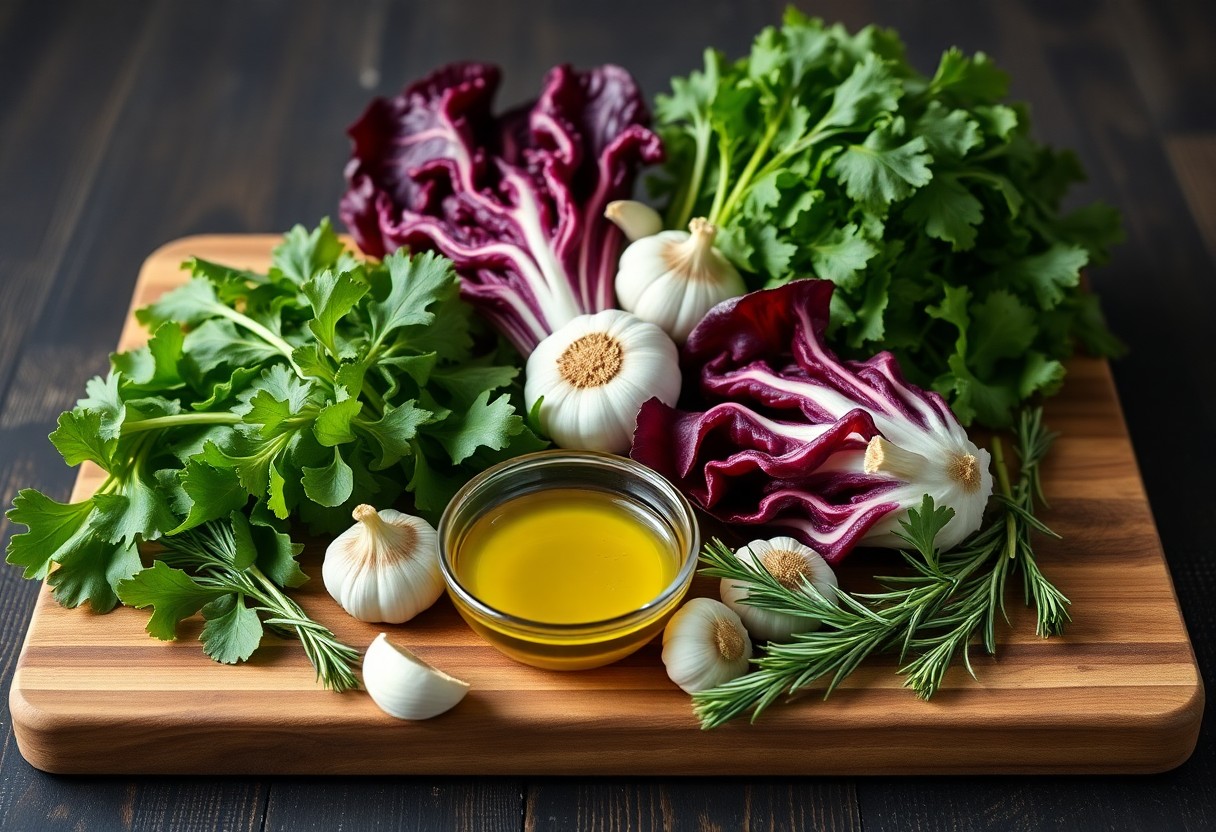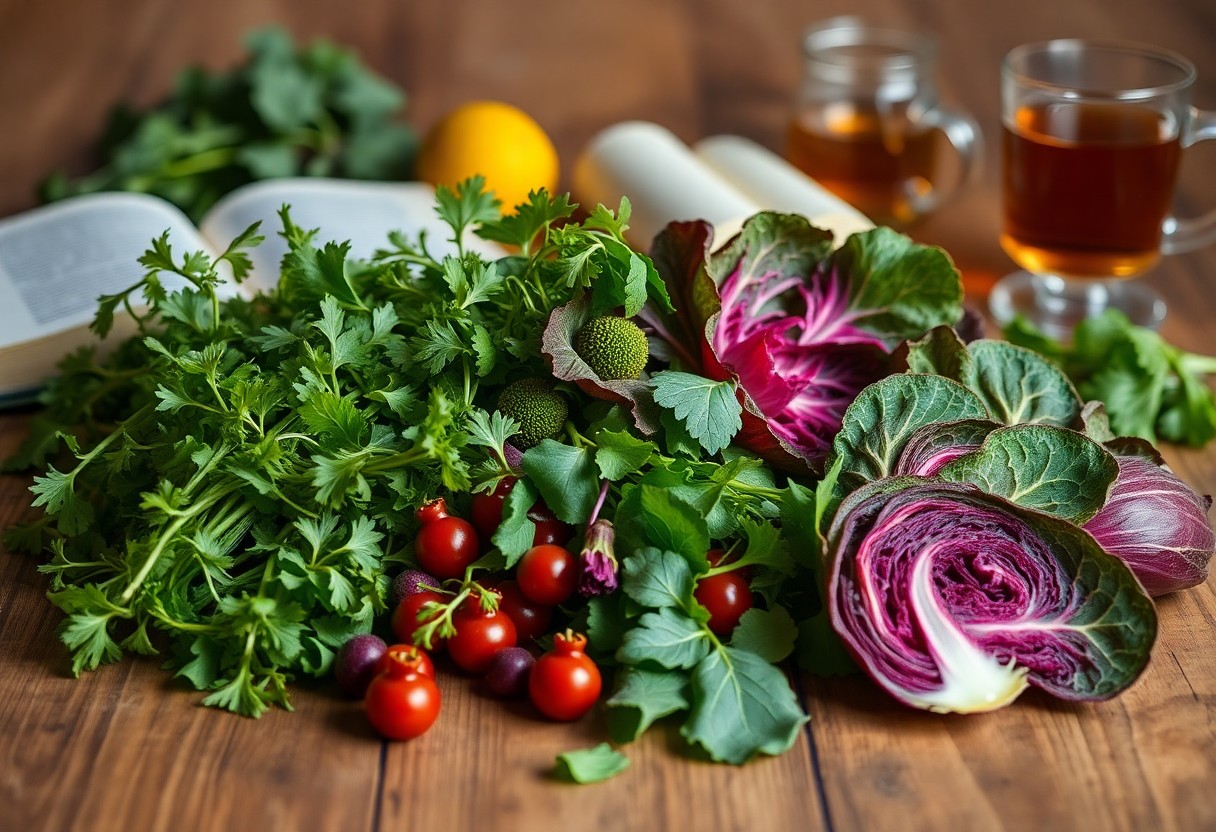Most people overlook the significant impact of bitter foods on your gut health. While often dismissed due to their sharp taste, these foods can enhance digestion and promote a more balanced gut microbiome. By stimulating the production of digestive enzymes and bile, bitter foods help break down your meals more effectively. Furthermore, they can reduce inflammation and support the growth of beneficial gut bacteria. Embracing bitter flavors in your diet may be just what you need to elevate your overall health and well-being.
Key Takeaways:
- Bitter foods can stimulate the production of digestive enzymes and bile, enhancing overall digestion and nutrient absorption.
- These foods may promote a healthier gut microbiome by fostering beneficial bacteria and reducing the prevalence of harmful microbes.
The Bittersweet Connection: How Flavors Affect Gut Microbiota
When you savor a bitter flavor, you might not realize how it can influence your gut microbiota. Bitter compounds stimulate saliva production and gastric juices, enhancing digestion and aiding nutrient absorption. Moreover, these compounds can act as prebiotics, feeding beneficial gut bacteria and promoting a diverse microbial environment. The connection between taste and gut health suggests that incorporating bitter foods into your diet can support a thriving microbiome, playing a vital role in overall wellbeing.
The Biochemical Impact of Bitter Compounds
Bitter compounds trigger a physiological response that can improve your gut health significantly. Compounds like quercetin and berberine have been found to enhance your gut’s immune response and lower inflammation. This biochemical response leads to an optimized environment for beneficial microbes, fostering your gut’s ability to effectively process and absorb nutrients. Increased bioavailability of crucial nutrients can have a direct influence on your overall health and energy levels.
Relationship Between Taste Perception and Microbial Diversity
The interplay between taste perception and microbial diversity is increasingly evident in gut health research. Studies indicate that individuals who regularly consume bitter foods may experience a broader variety of gut bacteria compared to those who avoid these flavors. Bitter taste receptors in your gastrointestinal tract connect with gut bacteria, encouraging diversity and resilience. This diversity enhances your gut’s ability to fend off pathogenic organisms, leading to improved digestion and overall health.
Exploring the relationship between taste perception and microbial diversity reveals a fascinating link between what you enjoy eating and the health of your gut. Research suggests that increased exposure to intense flavors, particularly bitters, correlates with a more diverse gut microbiome. For example, a study involving adults who consumed more bitter greens, such as arugula and kale, showed a marked increase in microbiome diversity compared to those with a milder diet. This variance has implications for your immune system and mental health, underlining the importance of incorporating a wide range of flavors, especially the bitters, in your meals.
Unlocking the Gut’s Secret: The Role of Bitter Foods in Digestion
Bitter foods, often dismissed due to their taste, play an unexpected yet significant role in enhancing your digestive processes. These intriguing flavors stimulate taste receptors that trigger the release of digestive juices, ensuring that your body is ready to break down food efficiently. Incorporating bitter greens like arugula or dandelion into your meals can lead to improved digestion, reducing bloating and gas while making nutrient absorption more effective.
Enhancing Digestive Enzyme Production
With every bite of those bitter delicacies, your body responds by ramping up digestive enzyme production. This boost helps to break down complex carbohydrates, fats, and proteins more effectively, ensuring that your meals turn into the energy and nutrients you need. As you indulge in bitter foods, your pancreas and stomach work harmoniously to produce enzymes that aid in thorough digestion, ultimately benefiting your overall gut health.
The Role of Bitter Foods in Nutrient Absorption
Inclusion of bitter foods in your diet can greatly enhance your body’s ability to absorb crucial nutrients. The physiological response triggered by these foods increases bile production and flow, which is vital for the digestion of fats and the absorption of fat-soluble vitamins such as A, D, E, and K. By promoting optimal bile flow, these foods dive deeper into the gut, allowing you to harness maximum nutrition from your meals.
When you consume bitter foods, you’re not just adding interesting flavors to your meals; you’re providing your body with the tools to efficiently absorb nutrients. For instance, leafy greens like kale or bitter melons have been shown to improve your gut’s health by enhancing the bioavailability of vitamins and minerals, ensuring they are utilized effectively. As a result, the bitter taste that was once unappealing can turn into a powerful ally in your quest for better health, empowering you to unlock the full potential of your diet.
From Dandelion Greens to Dark Chocolate: A Guide to Beneficial Bitter Foods
Delving into the world of bitter foods reveals an array of options that can positively impact your gut health. From the often-underappreciated dandelion greens and arugula, which can enhance digestion and encourage bile production, to the indulgent dark chocolate, rich in polyphenols, each bitter food carries unique benefits. Exploring these foods not only diversifies your palate but also supports your overall well-being.
Exploring Common Bitter Foods and Their Benefits
Common bitter foods like kale, cocoa, and coffee can be surprisingly beneficial for your gut. They encourage digestive enzyme production and support the balance of gut bacteria, making your digestive system work more efficiently. Incorporating these foods into your meals can provide a wealth of nutrients while maximizing the potential health benefits associated with their bitterness.
Integrating Bitter Flavors into Your Diet: Practical Tips
Incorporating bitter flavors into your diet can be a palette-pleasing experiment. Start by adding bitter greens to salads or smoothies, or opt for a splash of apple cider vinegar in dressings. You can also try roasting vegetables like Brussels sprouts to enhance their natural bitterness. Giving bitter foods a spotlight can lead to delicious meals that also capitalize on their health benefits. After experimenting, you may find new favorites that keep your meals balanced and interesting.
- Adding bitter greens to salads enhances taste
- Using apple cider vinegar in dressings boosts flavor
- Roasting vegetables can intensify their bitterness
- Integrating dark chocolate as a treat can satisfy cravings
Consider blending bitter ingredients into your daily meals by starting with simple swaps. For instance, pair your usual salad with a mix of arugula and spinach for an added punch. Incorporate bittersweet foods like grapefruit into your breakfast to create refreshing juices. You can also enjoy herbal teas rich in bitterness, such as chicory or bitter melon, for a healthful twist. After trying these tips, you’ll likely discover that embracing bitterness elevates your nutrition and enhances your overall health experience.
- Substituting arugula for lettuce adds depth
- Incorporating grapefruit into breakfast provides zest
- Drinking bitter herbal teas opens new flavor dimensions
- Exploring bitter chocolate can satisfy sweet cravings

Reassessing Dietary Preferences: The Cultural Shift Towards Bitterness
Modern dining habits are witnessing a significant transformation as you see an increasing enthusiasm for bitter flavors. Once regarded as undesirable, bitter foods are being re-evaluated through culinary explorations and a growing awareness of their health benefits. This shift challenges your palate and invites you to embrace new taste experiences that not only support your well-being but also spark creativity in your cooking.
Historical Context of Bitter Foods in Culinary Traditions
Bitter flavors have a rich history in global cuisines, often celebrated for their complex profiles. In ancient cultures, ingredients like bitter herbs and greens were revered not only for their taste but for their medicinal properties. From the use of dandelion leaves in traditional Mediterranean dishes to the incorporation of bitter melons in Asian cuisines, these foods have long been integral to maintaining health and flavor balance.
Current Trends and Consumer Perception of Bitter Flavors
The perception of bitter foods is shifting, fueled by a resurgence in interest in artisanal products and health-centric diets. Many consumers are now actively seeking out bitter options in craft cocktails, specialty coffee, and gourmet dishes. You may notice an increased focus on ingredients such as bitter greens, dark chocolate, and even coffee blends that celebrate bitterness, reflecting a renewed appreciation for the depth these flavors bring to your meals.
Recent studies indicate that your taste for bitterness may evolve with exposure, highlighting the importance of gradual integration into your diet. This trend is apparent in the rise of bitter craft beers, which have gained a loyal following among discerning drinkers. Moreover, the wellness movement promotes bitter foods for their potential digestive benefits, encouraging you to see these flavors as allies in a balanced diet rather than obstacles. As you explore this savory journey, you’ll find that embracing bitterness can enhance not only your meals but also your overall health.

Confronting Misconceptions: Debunking Myths About Bitter Foods
Bitter foods have long been misunderstood, often associated with negative experiences and limited culinary appeal. This perception overlooks the richness these flavors can bring to your diet and the significant health benefits they offer. By challenging the myth that bitter equals bad, you can open the door to a wealth of flavors that enhance not only your palate but also your gut health.
Bitter Foods and Their Impact on Taste Preferences
Your taste preferences are shaped by various factors, including culture and exposure. Incorporating bitter foods can broaden your palate, encouraging openness to complex flavors. Research suggests that repeated exposure to bitterness can shift your taste preferences, allowing you to savor these foods and appreciate their health benefits more fully.
The Relationship Between Bitterness and Health Perception
Bitterness often signals toxicity in nature, leading many people to perceive bitter foods as harmful. However, this association can overshadow the numerous health advantages they offer, such as improved digestion and nutrient absorption. As you embrace bitter flavors, it becomes imperative to recognize how cultural perceptions of taste can inform your health choices.
Perceptions around bitterness are deeply rooted in cultural and evolutionary contexts. Your instinct to avoid bitter foods stems from ancestral survival mechanisms; however, contemporary understanding shows that many bitter substances harbor potent health benefits. For example, compounds found in bitter greens and herbs promote liver function and digestive health. The shift towards appreciating bitter tastes in modern diets suggests that as you educate yourself about these foods, you can redefine your relationship with them and ultimately enhance your overall well-being.
Final Words
The surprising role of bitter foods in gut health cannot be understated, as they can significantly enhance your digestion and overall wellness. Incorporating bitter greens, spices, and herbal teas into your diet may help stimulate bile production, enhance nutrient absorption, and promote a balanced gut microbiome. By embracing these flavors, you not only diversify your palate but also invest in better health. Make it a habit to explore and enjoy bitter foods for their numerous benefits, and you will likely notice positive changes in your gut health over time.
FAQ
Q: What are bitter foods, and why are they important for gut health?
A: Bitter foods include items like kale, dandelion greens, arugula, and bitter melon, among others. These foods contain compounds that stimulate digestive enzymes and bile production, which can improve digestion. Additionally, they can help promote the growth of beneficial gut bacteria, contributing to overall gut health.
Q: How do bitter foods contribute to digestion?
A: Consuming bitter foods can enhance the digestive process by triggering the release of saliva and digestive juices in the stomach. This reaction helps break down food more effectively, making it easier for the body to absorb nutrients and may help reduce issues such as bloating or discomfort following meals.
Q: Can incorporating bitter foods into my diet help with gut issues like bloating or constipation?
A: Including bitter foods in your meals may help alleviate symptoms of bloating and constipation. The compounds found in these foods can stimulate gut motility and improve the balance of gut bacteria, both of which are beneficial for regular bowel movements and reducing bloating.
Q: Are there any downsides to eating bitter foods?
A: While bitter foods are generally safe for most people, some individuals may find them unpalatable or harsh on their stomachs when consumed in large quantities. It’s advisable to introduce bitter foods gradually into your diet and observe how your body reacts, as some individuals with sensitive digestive systems may need to limit their intake.
Q: How can I incorporate bitter foods into my meals?
A: There are various ways to add bitter foods to your diet. You can use them in salads, smoothies, or soups. Try creating a salad with arugula or adding sautéed bitter greens like kale to your dishes. You can also experiment with bitter herbs and spices in your cooking or consume them as herbal teas to enjoy their benefits.
